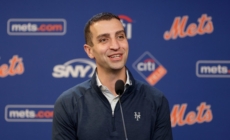-
Austin Reaves Accomplishes Lakers Milestone Not Seen Since Kobe Bryant - 18 mins ago
-
Knife-wielding suspect fatally shot inside a Ralphs grocery store in Santa Barbara - 32 mins ago
-
Older New Yorkers Brace for Food Stamp Cuts: ‘I’m Just Praying’ - 45 mins ago
-
Jey Uso Hates What WWE Fans Are Saying About Him - 53 mins ago
-
Department of Homeland Security officers involved in shooting - about 1 hour ago
-
Does Latest Tarik Skubal Contract Update Put Mets in Driver’s Seat for Ace? - about 1 hour ago
-
Judge Skeptical Over Trump Administration Decision to Suspend Food Stamps - about 1 hour ago
-
Commentary: These are thirsty times. No wonder Kamala Harris’ book tour is a fan fest - 2 hours ago
-
Two Health Systems Settle Cases Over Alleged Data Sharing with Meta - 2 hours ago
-
Israel’s Ultra-Orthodox Stage ‘March of the Million’ Against Military Draft - 2 hours ago
Wave of RSV, particularly dangerous for babies, washing over U.S.
A wave of the highly contagious respiratory syncytial virus is beginning to wash over the United States — sending greater numbers of babies and toddlers to the hospital, recent data show.
The onset of RSV comes as the country heads into the wider fall-and-winter respiratory virus season, also typically marked by increased circulation of ailments such as COVID-19 and the flu. But RSV, the leading cause of infant hospitalization nationwide, presents particular risk for the youngest babies, a major reason health experts recommend pregnant women either get vaccinated near their delivery date or immunize their newborns.
“This is the perfect time to get your vaccine for RSV if you have never gotten one,” the Los Angeles County Department of Public Health said in a statement to The Times.
RSV can spread through coughs or sneezes but also by touching a contaminated surface, such as a door handle, and then touching your face before washing your hands, health officials warn.
For the week ending Oct. 11, about 1.2% of emergency room visits nationwide among infants younger than 1 were due to RSV — up from 0.4% a month earlier, according to data posted by PopHIVE, a project led by the Yale School of Public Health.
“An RSV wave is starting to take hold,” epidemiologists Katelyn Jetelina and Hannah Totte wrote in the blog Your Local Epidemiologist.
RSV can be dangerous for infants, older adults and people with certain medical conditions, according to the U.S. Centers for Disease Control and Prevention. RSV can cause pneumonia, as well as a severe inflammation of the lungs’ small airways, known as bronchiolitis, the California Department of Public Health said.
In general, about 2% to 3% of young infants will be hospitalized for RSV annually, according to the CDC. Most children who are hospitalized for acute respiratory disease caused by RSV were previously healthy, according to a study published by the journal Pediatrics.
They may require oxygen or intravenous fluid or even be put on a ventilator to help them breathe, according to the CDC.
Unlike the flu and COVID-19, there are no antiviral drugs to treat RSV once infection sets in.
For now, the combined activity of respiratory illness from RSV, flu and COVID-19 is considered “very low” in California, state health officials said.
But “we are starting to see the beginnings of respiratory virus season,” the L.A. County Department of Public Health said.
Health officials in Santa Clara County, Northern California’s most populous, are already reporting “medium” levels of RSV in the wastewater of San José, Palo Alto and Sunnyvale.
Now is exactly the time to get vaccinated if you haven’t already — “especially before respiratory virus activity potentially increases later,” said Dr. Regina Chinsio-Kwong, the Orange County health officer.
RSV immunizations are recommended for pregnant women between 32 and 36 weeks of gestational age — about one to two months before their estimated delivery date — as well as for everyone age 75 and up and those age 50 to 74 with underlying medical conditions such as diabetes, cancer, kidney disease, weakened immune systems, asthma or heart disease. Vaccines are also recommended for individuals who live in a nursing home or long-term-care facility.
If a pregnant woman wasn’t vaccinated against RSV, officials recommend her infant get immunized.
RSV vaccinations are fairly new, being introduced in 2023. There are now three brands — Moderna’s mResvia, Pfizer’s Abrysvo and GSK’s Arexvy. All three can be used for older adults, but only the Pfizer vaccine is available for pregnant women.
Infants were also able to get immunized starting that year through monoclonal antibodies, which aren’t technically vaccines but function similarly in this case.
Older adults who already received an RSV vaccination generally don’t need to get another one.
The arrival of those vaccines followed a particularly brutal 2022-23 respiratory virus season when California was slammed by a hospital-straining “tripledemic” of RSV, flu and COVID.
Unlike the RSV shots, flu and COVID vaccinations are generally recommended ahead of every fall-and-winter virus respiratory season. Older adults, those age 65 and up, can get the COVID vaccination every six months, according to the California Department of Public Health.
People can get the RSV, flu and COVID vaccinations all during the same visit to a healthcare provider, Chinsio-Kwong said.
“Receiving all eligible vaccines at once is considered best practice, as it helps avoid missed opportunities due to scheduling challenges,” she said.
Annual routine flu vaccines are recommended for everyone who is at least 6 months old.
As for COVID, a vaccine can be given to anyone who wants one. The California Department of Public Health specifically recommends the shots for everyone age 65 and up, babies age 6 months to 23 months, children and teenagers who have never been vaccinated, and people with certain health risk factors and those in close contact with them.
The California Department of Public Health also recommends pregnant women get the COVID vaccination.
After concerns earlier this season about how difficult it might be to get COVID vaccinations, pharmacists and California health officials now say securing the shots is relatively easy.
The controversy arose in the late summer amid confusing guidance coming from agencies overseen by Health and Human Services Secretary Robert F. Kennedy Jr., who has disparaged vaccinations.
There was a period during which the Food and Drug Administration had belatedly approved COVID-19 vaccines only for those age 65 and up and younger people with underlying health conditions. An unprecedented delay in the CDC issuing its own recommendations had the effect of snarling vaccinations for many.
In some states, that meant people were being turned away from getting the COVID vaccine at their local pharmacy, including seniors, even as a late summer surge was raging. And at one point, the powerful CDC Advisory Committee on Immunization Practices nearly recommended the COVID vaccine be available by prescription only.
On Oct. 6, acting CDC Director Jim O’Neill officially lifted the agency’s recommendation that adults under age 65 get the updated COVID-19 vaccine, saying instead that doing so should be based on “individual-based decision-making” in consultation with health professionals.
Now, “patients can go into the pharmacy” and can have conversations on whether to get the COVID-19 vaccine with a professional, Allison Hill, a director of professional affairs for the American Pharmacists Assn., said during a recent webinar.
California also recently clarified state law to make sure that pharmacists can independently administer the COVID vaccination, according to Dr. Erica Pan, director of the state Department of Public Health.
Source link
















